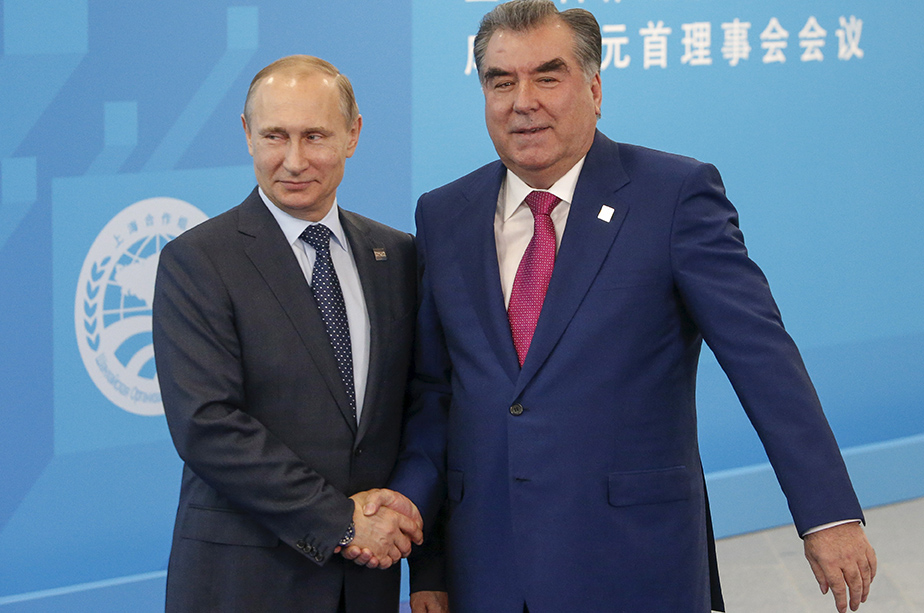 Faced with a weak economy and a resurgent Taliban across the border in Afghanistan, Tajikistan’s president, Emomali Rahmon, has employed Russian President Vladimir Putin’s counterterrorism rhetoric to justify repressive political and religious policies that he is using to silence his opponents.
Faced with a weak economy and a resurgent Taliban across the border in Afghanistan, Tajikistan’s president, Emomali Rahmon, has employed Russian President Vladimir Putin’s counterterrorism rhetoric to justify repressive political and religious policies that he is using to silence his opponents.
Frequently portrayed by commentators and analysts as being at risk of imminent collapse, Rahmon’s regime has proved remarkably resilient in the face of insurgent threats since 1992. However, the ongoing crackdown, both on the Muslim community and the media, could create instability which will not only undermine Rahmon’s regime, but also offer the Kremlin a major opportunity to consolidate its influence over Tajikistan.
Classified by Freedom House’s 2016 annual report as one of sixteen countries with the most significant negative trends in terms of political rights and civil liberties, Tajikistan’s is considered the most economically and politically vulnerable regime among the five Central Asian republics. Rahmon, who has ruled Tajikistan for the past twenty-four years, has invested in building a close relationship with Russia. His fourth and current term, which was to end in 2020, was supposed to be his last. This year, however, the parliament approved amendments to the constitution to allow the president to indefinitely run for office. The amendments were approved in a referendum. This sets a dangerous precedent and is a striking example of failure of the international community, which was unable to prevent Rahmon from consolidating power.
The constitutional amendments prevent the creation of any meaningful alternative to the Islamic Renaissance Party of Tajikistan (IRPT), Tajikistan’s leading opposition party. The IRPT has been declared a terrorist organization by Tajikistan’s supreme court and was banned in September of 2015. In June of 2015, IRPT leader Mukhiddin Kabiri went into exile fearing prosecution on trumped up charges.
The constitutional amendments also block the formation of any political party with religious affiliations. In theory, an opposition party that has no religious affiliation could be created, but the crackdown on political opponents as well as the reported harassment of independent journalists make that highly unlikely.
By instigating an artificial policy of “Tajikisation,” restricting the use of headscarves, and forcing men to shave their beards, Rahmon’s crackdown will drive what remains of the opposition underground, as happened in the 1980s.
A parallel concern, the country’s economic stagnation, partly caused by decades of nepotism and reinforced by the current economic slowdown in China and Russia—Tajikistan’s main trade partners—may add fuel to the public’s frustration. As the country relies heavily on migrants’ remittances and imports of food and fuel, the inflationary pressure, as well as growing unemployment, are likely to increase.
Through the enforcement of restrictive religious and political policies and failure to fix the economy, Rahmon has made radical alternatives more attractive to young Tajik Muslims. This has also made Tajikistan more vulnerable to the influence of groups such as the Islamic State of Iraq and al-Sham (ISIS) and the Taliban.
Last year, the defection to ISIS of Gen. Gulmurod Khalimov, a former head of the Tajik Special Assignment Police Unit (OMON), raised questions about Rahmon’s ability to command the loyalty of the country’s security elite on which his power has relied heavily since 1992. Meanwhile, the number of Tajik nationals fighting in ISIS’ ranks, estimated at 2,000, keeps growing.
Since the parliamentary elections in March of 2015, the government has expanded its use of repressive measures against political opponents and Islamic practices. Regional leaders have been acting as warlords, controlling lucrative drug trafficking routes. Dushanbe has struggled to maintain control, particularly over Tajikistan’s porous border with northern Afghanistan, a region that is a hotbed for smugglers.
In this troubled and potentially explosive environment, underlined by the rise of tensions between Kyrgyzstan and Uzbekistan in March, and the deteriorating security situation south of the Afghan-Central Asian border, the lack of solidarity and cooperation between the five Central Asian republics may increase the vulnerability of Rahmon’s government. China has not been keen to engage in a security-oriented partnership with Tajikistan, and the United States and the European Union are mostly absent. As a result, Tajikistan might find itself increasingly isolated and potentially exposed to more religious-ethnic clashes and instability on its southern border. Tajikistan could quickly become the weak link in Central Asia. More importantly, this is a major opportunity for Russia to fill the apparent regional security vacuum and, despite the visit of Gen. Joseph Votel, the commander of the US Central Command, to Dushanbe on June 15, use its “counterterrorism rhetoric” to establish itself as the only reliable partner of Rahmon and other authoritarian leaders in Central Asia.
Jeanne Fréchède is a former intern at the Atlantic Council’s Dinu Patriciu Eurasia Center.
Image: Russian President Vladimir Putin (left) shook hands with Tajikistan’s president, Emomali Rahmon, at the Shanghai Cooperation Organization summit in Ufa, Russia, on July 10, 2015. (Reuters/Sergei Karpukhin)
